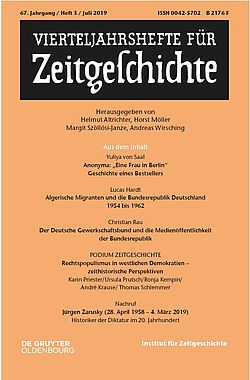- The Institute
- Research
- Dictatorships in the 20th Century
- Democracies and their Historical Self-Perceptions
- Transformations in Most Recent History
- International and Transnational Relations
- Edited Source Collections
- Dissertation Projects
- Completed Projects
- Dokumentation Obersalzberg
- Center for Holocaust Studies
- Berlin Center for Cold War Studies
- Publications
- Vierteljahrshefte
- The Archives
- Library
- Center for Holocaust Studies
- News
- Dates
- Press
- Recent Publications
- News from the Institute
- Topics
- Munich 1972
- Confronting Decline
- Feminist, Pacifist, Provocateur
- Der Mauerbau als Audiowalk
- Digital Contemporary History
- Transportation in Germany
- Envisaged Futures at the End of the Cold War
- From the Reichsbank to the Bundesbank
- German Federal Chancellery
- History of Sustainabilities: Discourses and Practices since the 1970s
- Changing Work
- Democratic Culture and the Nazi Past
- The History of the Treuhandanstalt
- Foreign Policy Documentation (AAPD)
- Dokumentation Obersalzberg
- Hitler, Mein Kampf. A Critical Edition
- "Man hört, man spricht"
- IfZ
- Vierteljahrshefte
- VfZ Archive
- Issue Index
- Issue July 2019
- Printversion
Issue 3/2019
Content Overview: English Titles and Abstracts:
- Yuliya von Saal: Anonymous: “A Woman in Berlin”. The History of a Bestseller.
- Lucas Hardt: Refugees, Terrorists, Freedom Fighters? Algerian Migrants and the Federal Republic of Germany, 1954 to 1962.
- Christian Rau: From Opponents to Partners? The German Trade Union Confederation and Media Policy in the Federal Republic of Germany.
- Contemporary History Podium: Right-Wing Populism in Western Democracies – Historical Perspectives: Karin Priester, Ursula Prutsch, Ronja Kempin, André Krause and Thomas Schlemmer.
- Obituary on Jürgen Zarusky (April 28, 1958 - March 4, 2019).
Abstracts
Yuliya von Saal, Anonymous: “A Woman in Berlin”. The History of a Bestseller
The book “A Woman in Berlin”, the publication of a diary written between 20 April and 22 June 1945 by an anonymous female author, was put on the market in Germany as a document of the times in 2003, was sold millions of times, translated into many other languages and made into a film. The authenticity of the diary has, however, been questioned, especially as nobody has had full access to the handwritten original. In 2016 the papers of the anonymous female author were handed over to the Archives of the Leibniz Institute for Contemporary History. Yuliya von Saal has studied the papers and the original diary for the first time. She recounts the history of a bestseller and finds that the published diary cannot be viewed as an authentic source of the time from a source-critical perspective. It is, however, a very personal, albeit literary testimony of a woman who was a keen observer.
Lucas Hardt, Refugees, Terrorists, Freedom Fighters? Algerian Migrants and the Federal Republic of Germany, 1954 to 1962
The article investigates the reasons and the extent of Algerian immigration to the Federal Republic of Germany between 1954 and 1962 as well as the institutional consequences. By 1958 at the latest, Algerian migration to West Germany has to be understood as a form of flight from the violent struggles in France regarding Algerian independence. In Europe, West Germany became the most important country of refuge for Algerians living in France. Due to political pressure from Paris, they did not receive political asylum. Nevertheless, West German authorities developed their own position towards the so-called French Muslims of Algeria.
Christian Rau, From Opponents to Partners? The German Trade Union Confederation and Media Policy in the Federal Republic of Germany
The 1980s were a decade of crisis for the West German trade unions. Scandals and a sinking degree of organisation shaped their public image. The German Trade Union Confederation (Deutscher Gewerkschaftsbund) was faced with what it saw as a media landscape hostile to trade unions. The umbrella organisation had been discussing its relationship to the commercial media controversially since the 1950s. Time and again there were conflicts between trade union leaders and public relations officers. Reunification in 1990 opened a wide field for media policy experiments but these did not succeed in their purpose to reveal the deficits of previous media work. The article investigates this contested relationship between rapprochement and differentiation.
Contemporary History Podium: Right-Wing Populism in Western Democracies – Historical Perspectives
The future of democracy as well as the challenges arising from globalisation on the one hand as well as the illiberal or even authoritarian temptation on the other hand are keeping politicians, the wider public and research busy in many countries of Europe and America. The successes of (right-wing) populist parties and movements in established democratic countries with their often nationalist and equally anti-modern and xenophobic rhetoric pose the question as to the potential risks and democratic courses of action. The “Contemporary History Podium” wishes to put these phenomena into clearer historical perspective by using five case studies: The Federal Republic of Germany (Karin Priester), the USA (Ursula Prutsch), France (Ronja Kempin), the Netherlands (André Krause), and Italy (Thomas Schlemmer). They reveal the interdependence of long-term developments, socio-political upheaval and current crises. New parties such as the Alternative für Deutschland as well as established parties such as the Rassemblement National (formerly Front National) are examined. An important emphasis is laid on leading figures such as Marine Le Pen, Geert Wilders, Donald Trump or the almost forgotten Silvio Berlusconi, who are especially important as catalysts of populism in their respective countries.
04/09/2024
„Die Lebensbeichte des Bandera-Mörders“
Der "Münchner Merkur" zu Grzegorz Rossoliński-Liebes Dokumentation im Aprilheft der VfZ
mehr
04/04/2024
„Die Beichte des Mörders von Stepan Bandera“
Die „Süddeutsche Zeitung“ zu Grzegorz Rossoliński-Liebes Dokumentation im Aprilheft der VfZ
mehr
04/02/2024
Druckfrisch: VfZ 2/2024
Das Aprilheft der Vierteljahrshefte für Zeitgeschichte ist erschienen
mehr








